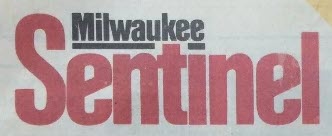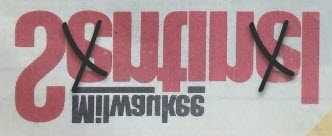HOW I BROKE MY BIIGGEST SCOOP IN MILWAUKEE
The untold story of my exclusive on the killing of the Milwaukee Sentinel
By Mark Belling, WISN-AM
It started with a conversation after an AA meeting.
* * *
(What follows is my first-ever explanation of how I in 1995 broke a news story that roiled local media and produced years of speculation and rumors about who spilled the beans in what was a tightly guarded secret at Milwaukee’s then media monolith.
The internet wasn’t a thing yet. The only cable news channel was CNN. Newspapers and television were the dominant news sources for almost all Americans. In Milwaukee, one company, Journal Communications, controlled much of it. The Milwaukee-based company owned the legendary evening newspaper, the Milwaukee Journal, and the morning paper, the scrappy Milwaukee Sentinel. They were the two biggest circulation papers in the state with the Journal having a daily circulation of about 240,000 and the Sentinel 170,000. In addition, the company owned WTMJ-TV, usually the highest rated local news station, and WTMJ-AM, the top radio station in terms of listenership and the biggest FM music station, WKTI. The Journal Company essentially was the Milwaukee media.
Competitors chafed about this. Andy Potos, the general manager of Channel 6, fumed that the newspapers shilled for Channel 4 and the Journal radio stations. I used my suddenly hugely successful radio program to focus on the bias of all the Journal outlets and their tendency to use one outlet to pump up another. WKTI even paid a Journal gossip columnist to appear on their Reitman and Mueller morning show and the reporter, Meg Kissinger, would return the favor by writing frequent items about the hilarious stunts pulled by the two. It was all rather nauseating.
The Journal Company was huge. But things were changing. The web revolution wasn’t here yet but afternoon newspapers were dying all over the country. Readers preferred getting fresh news first thing in the morning. The Milwaukee Journal was the company’s flagship and still had the bigger circulation but the Sentinel was catching up. The Journal had a bigger staff and was the pet of the corporate leaders but the afternoon delivery time was leading it to dinosaur status.
What to do? They decided to kill the Sentinel. I found about it.)
* * *
I have broken scores of major news stories in my career, both as a traditional and award-winning journalist before I came to Milwaukee in 1989 and then as a talk show host after I got to WISN-AM. I was good at it. I have never ever revealed a confidential source. It’s one of the reasons people feel comfortable tipping me off to things.
Most people in the news business adhere to an unwritten rule that if a source has died, it is okay to reveal their identity. I don’t buy that in all cases, particularly if the info the source dished out was a result of a violation of the law or something like that. But in this case, my sources were merely telling me something the biggest news organization was trying to conceal. They’re mostly all dead now. So I’m telling the story and naming some names.
My radio station, WISN-AM, had recently been sold by Hearst Corporation to SFX Communications. We continued to share a building with Hearst’s WISN-TV but had no common ownership. An employee of the new corporation (who is still alive) gave me an astounding tip. To this day, I have never heard of anyone getting a tip on a major news story this way.
My acquaintance from the company is a member of Alcoholics Anonymous. A fellow AA member confided to him that he was rearranging all of his finances because his employer was going to have a major reorganization and some positions would be eliminated. The employer was Journal Communications and the reorganization was going to be ending the afternoon newspaper and moving the Journal to mornings with most of the Journal’s top bosses running a newly branded Milwaukee Journal Sentinel. Some Sentinel employees would be retained but the Journal would be the dominant survivor. My acquaintance told me what his AA friend confided.
The story sounded very real and very credible but the sourcing was ridiculously thin. (The Journal Company employee who passed along the information died many years ago.) I obviously needed confirmation from somebody either in the company or in a position to know everything.
Newspapers are hornet’s nest of gossip. (At least they were when actual news hounds worked there and there were a lot of them, as opposed to the glorified stenographers who practice what “journalism” has degenerated into.) I figured if something like this was going on, a lot of people had to know. I started with the union that represented the reporters. Joel McNally, who held a zillion jobs at the paper before the post-merger downsizing led him to other local media gadfly opportunities, was the head of the union. I called him up. He said I was probably wrong. Joel told me he had heard nothing. There had been rumors over the years of something like this but nothing lately. All quiet, he said. This invigorated me. If McNally didn’t know, no reporters knew. I was sitting on a scoop that nobody else had.
I was in my sixth year in Milwaukee and already had a lot of sources and some pretty well-connected friends. I tried to figure out who would know and might be willing to spill the beans to me if I promised I wouldn’t name them. I started with Bob Dye, the Journal Communications public relations chief. Dye wouldn’t confirm anything but his denial was mealy-mouthed. I already had twenty years in the news business behind me and I’ve been lied to, spun and misled a lot. Dye’s denial kept including what I perceived as hedges. Saying stuff like “nothing is happening right now.” I was sharp enough to know that the use of words like “right now” constituted a non-denial denial. Still, I got nothing from Dye. I worked him hard. I have found that public relations people can be great sources because they have a need to build relationships in the future with reporters. I thought I could get Dye to give it up. He didn’t but his weaseling around convinced me I was on the right track.

The head of Journal Communications at the time was a gruff old guy named Robert Kahlor. He was old school, to say the least. He was a downtown insider and on the boards of lots of civic organizations. I knew there was zero chance Kahlor would spill the beans on his own deal but thought there was a good chance he would give a heads-up to some of his buddies. The dominant Milwaukee insider group at the time was the Greater Milwaukee Committee. It’s still around but in a very invisible type of way. Not in the 1990s. The GMC had its finger in everything. The executive director was a former Kohler Corporation executive named Bob Milbourne. He had been on my show a few times and was very savvy in knowing how to handle people in the media, even a wildcard like me.
I called Milbourne and asked him if he knew anything. He confirmed the story. He seemed to know everything. He said there would be one paper and the leadership would mostly be people from the Milwaukee Journal. He said company executives were convinced circulation would be higher than at either the existing Journal or Sentinel. They could save a fortune by consolidating. I didn’t ask Milbourne how he I knew but I knew it had to be Kahlor or somebody like that.
Now, I knew I was right. But I wanted more. Putting a story out there like this and being wrong would have been humiliating and would have killed my credibility. I also understood that nothing would infuriate the reporters for the Journal and Sentinel more than to know I scooped them on a story in their own building. I also knew many would freak if they knew some of their jobs were going to be eliminated.
I tried Dye again. More non-denial denials. I called a few other people in the company and don’t remember anymore who they were because none gave me anything. Some probably didn’t know and others were just lying to keep the secret a secret. I figured there was a good chance the mayor’s office would be alerted to something like this. The problem was that then-Mayor John Norquist hated me. I was constantly dogging him. Still, if I’ve learned anything it’s that sources don’t have to like you or be on your side ideologically. (I’ve probably gotten more big stories from Democrats than Republicans over the years.) My recollection is that Norquist didn’t get on the phone but one of his aides called me back. I was told the mayor didn’t have any specifics. I felt that was a coded confirmation.
I went back to my company acquaintance who had the talk with his AA friend. He provided way more detail. The AA member (I knew who it was) was clearly in a position to know everything).
I decided to go with what I had. I went on the air and said that the Sentinel was to be killed and there would be one surviving newspaper. I said I didn’t know when this was going to happen and knew nothing about how it would be structured and whether it would be called a merger. I didn’t know the name of the combined paper or how many people would be fired. I did say the surviving paper would have more leaders and staffers from the Journal than the Sentinel.
All sorts of people reacted and called me after I put the story out. But, in what has come to be typical of a Milwaukee media that was drifting toward being a lazy clique, nobody else picked up on anything. They didn’t even ask the Journal company if the story was true. Nothing appeared in the Journal or the Sentinel. It was a Tuesday, as I recall.
I was told that the two newsrooms were in a tizzy. They didn’t know if the story was true. Some reporters obviously thought I was a half-cocked radio hack in over my head and others, who knew me better, knew I was likely onto something.
I doubled down. I spent an hour on it the following day and tried to shame the paper into commenting and shame local TV stations into asking questions. I was trying to flesh the story out, hoping somebody else in the know would talk, preferably to me. In the meantime, back at the Journal Sentinel building reporters were demanding to know from their bosses what was going on.
I called Dye, the company flack, again. I worked him hard, telling him the company and the papers’ credibility would be shot by covering up a story they themselves were involved in. Dye softened and said he had nothing for me right now. Hmmmm.
A local TV station covered the story on (I think) Thursday. It never quoted my reporting but merely said “rumors” were swirling. Finally, something appeared in print. The Sentinel ran an item seemingly denying my story. It quoted Keith Spore, the Sentinel editor and a rising star in the corporation. Spore said reports of the paper’s demise were wrong. “Milwaukee will continue to have its morning newspaper,” he said.
My instincts were that Spore was lying through his teeth. The denial was fuzzy and oddly worded. This was going on around the time Bill Clinton was weasel-wording about everything. Still, I was concerned. Lots of people started mocking me saying I had the story wrong.
I called Milbourne to triple-check our earlier conversation. Bob told me I had the story exactly right and then said “My impression is this will happen sooner rather than later. It is imminent.” I knew Milbourne was telling me the truth. He had no reason to lie and he was the best connected guy in town. He knew. And, as a result, I knew.
I went back on the air and tripled-down. I said Spore’s denial was a crock and that the axe falling was imminent. In the meantime, two top editors at the Journal weren’t returning my calls, I said. If I was wrong, they’d be denying it in my face and rubbing it in. Their silence told me they didn’t want to be lying on the record. I hammered and hammered the story.
The following Monday, the Sentinel called a staff meeting. Somebody went out and got Milwaukee Sentinel baseball caps for everybody to wear. They knew what was coming. In the meeting, the staff was told the two newspapers would be “merged” and there would be open competition for all positions on the staff. A news release followed. Both papers then plastered the story on page one spinning it as best they could.

My radio management wanted to take full advantage of my huge scoop. We commissioned a big ad to be placed in both papers. It featured my picture and the station’s call letters with a big headline that read: “When The Journal Company Decided To Kill A Newspaper, You Didn’t Read It In This Paper.” And, under my picture, the headline read: “MARK BELLING’S Listeners Heard About It One Week In Advance.” The Journal and Sentinel both refused to run it. It is currently framed and hanging in my office.
* * *
For years people have asked who tipped me off. Wild rumors started. The weirdest actually had a shred of truth amid a story that was preposterous. That rumor stated I was having lunch at the University Club with Summerfest boss Bo Black and we overheard Bob Milbourne blabbing about it at an adjacent table. Panelists on my then TV show all heard it and were convinced it was true. The weird thing is Milbourne was the key source but nothing was ever overheard at a lunch involving Bo Black. Bo and I did go to lunch there once and maybe somebody saw us together. Maybe Milbourne was in there. Who knows? But it had nothing to do with getting this story.
That story was also one of about 900 rumors over the years dealing with me and Bo. Speculation about what kind of relationship we had was a constant subject of gossip. Bo, a Milwaukee icon and a wonderful human being, passed away several years ago. The University Club is closed too but, in a total coincidence, I live very close to it.
A former panelist on the TV show (he was a blowhard) told people that I simply took a wild guess. Indeed, there had been speculation for years of killing off one of the papers. The idea that I would guess is idiotic. I was making a huge name for myself. I was a constant critic of the media. Guessing, and being wrong, would have been fatal.
Others thought McNally from the union told me. I got along with Joel fine over the years and he was a spectacular panelist on the TV show. But he has never given me a news tip in either of our lives and often wrote critical things about me. I even heard that the Sentinel’s Spore leaked it to me. I never denied that even though it wasn’t true. Since Spore was forced to walk the plank with the inaccurate non-denial denial, if some people wanted to guess he was the blabber mouth that would be fine with me.
Bob Milbourne died this week. He left Milwaukee a few years after the Journal story and spent a long time as a big wheel in Columbus, Ohio. Bob Dye passed away a few years ago. My corporate employee who knew the Journal insider from AA is still alive but has struggled with health issues for many years. The Journal insider? He too passed away a long time ago. I am not naming him but not because of his role in leaking the newspaper story but because it would identify him as an AA member (although I am told it was never a secret).
Mark Belling
October 17, 2024

